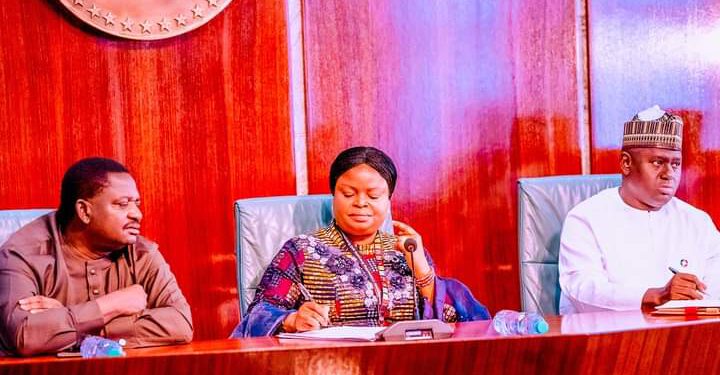The federal government says Nigeria is on course to achieve the United Nations agenda 2030 on sustainable development goals (SDGs).
Adejoke Orelope-Adefulire, senior special assistant to the president on SDGs, said this on Thursday during a presidential media team briefing on ‘Nigeria’s milestones on the sustainable development goals (SDGs)’.
The United Nations agenda 2030 seeks to achieve the elimination of poverty and extreme hunger, ensure equitable and universal access to education, other sustainable development goals by 2030.
Mathias Schmale, the United Nations (UN) resident and humanitarian coordinator had recently said Nigeria is not on track to achieve the SDGs.
Speaking on the development, Orelope-Adefulire said the federal government has displayed commitment towards achieving the SDGs by providing institutional frameworks at the national and sub-national level.
“The Nigerian government has demonstrated strong commitment towards the 2030 agenda for sustainable development and the SDGs,” she said.
“Institutional frameworks have been established at the national and sub-national levels to support effective implementation of the SDGs. Thus, Nigeria is leading in the institutionalisation of the SDGs.
“In partnership with the National Bureau of Statistics (NBS), we have successfully re-aligned Nigeria’s National Statistical System (NSS) with the requirements and indicators of the SDGs.
“This re-alignment started in 2018 and concluded late last year, with the official launch of the report by the vice-president on December 21, 2021.
“This strategic initiative will enable Nigeria to rely on its national statistical sources to track the implementation of the SDGs on an annual basis. With this, Nigeria is now the first African country to successfully re-align its statistical system with the indicators of the SDGs.”
On the domestication of the integrated sustainable development goals simulation model (iSDG), she said the process is ongoing.
“The iSDG model is a home-grown analytical framework and policy simulation model for use in aligning national development strategies with the SDGs, thus enabling line ministries, departments and agencies (MDAs) to channel resources towards SDG areas,” she said.
“Nigeria began the process of iSDGs domestication in 2017, and the report was officially launched by President Muhammadu Buhari on the margins of the 74th session of the United Nations general assembly (UNGA) on September 24, 2019.
“We have now integrated the SDGs into the Nigeria National Development Plan (2021–2025) and Nigeria Agenda 2050.”
She added that Nigeria is set to present the third voluntary national reviews (VNRs) to the United Nations high level political forum (HLPF) by July 2023, sequel to the presentation of the first and second VNRs in 2017 and 2019, respectively.
The VNRs, according to Orelope-Adefulire, “serves as a cornerstone of the follow-up and review mechanisms for the 2030 agenda”.
Orelope-Adefulire also said “robust monitoring and tracking systems have been designed to ensure effective tracking of interventions using computer-assisted software”.
“To leave no one behind, we need the expertise and resources of all – public and private sectors, UN development system, donor community, academia, civil society and concerned citizens,” she added.
Culled from Cable news














